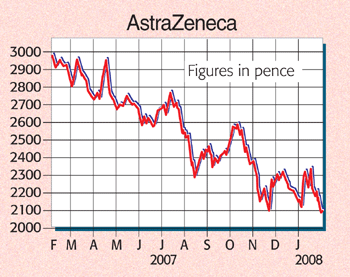
Eighteen months ago, overstretched valuations and patchy new product development meant that this stock looked like a strong sell. But with a good range of new drugs in the pipeline, it’s looking much healthier these days.
AstraZeneca (AZN), rated a BUY by Panmure Gordon
In July 2006, I advised shareholders to sell out of AstraZeneca at £31.94 due to holes in its drugs pipeline and concerns over its stretched valuation. Since then the stock has fallen a painful 35%. So why do I now think the shares are a buy?
AstraZeneca is the world’s eighth-largest pharmaceutical firm by market capitalisation. It specialises in cancer, cardiovascular, gastrointestinal, infection, neuroscience and respiratory treatments. Last week it reported 2007 turnover and underlying earnings per share of $29.6bn and $4.38 respectively. Although broadly in line with City estimates, the shares dived 5%, triggered by a 12% drop in the fourth quarter in sales of its bestselling drug, Nexium, used to treat stomach ulcers. Even though Nexium is patent protected until 2014, it was hit by lower selling prices as budget-constrained customers switched to less effective but cheaper generic medicines.
The board indicated that 2008 revenues for Nexium would fall, resulting in a slew of broker downgrades. But I believe the pessimism has been overdone. On revised expectations, the stock now trades on adjusted 2008 and 2009 p/e ratios of only 9.6 and 8.6 – which looks too cheap for such a science-rich behemoth. On top of this, the near-5% dividend yield, covered 2.2 times, should also help underpin the valuation from further downside pressure.
Astra has also greatly improved its drugs pipeline over the past 18 months. First it bought Cambridge Antibody Technology (CAT) in August 2006 for £702m, and followed this up with the $15.2bn acquisition of MedImmune last year. By integrating these deals with its own top-notch research, Astra is now a world leader in ‘biologics’. These are products, such as antibodies and vaccines, that cure infectious diseases, viruses and cancers, but are derived from living organisms rather than chemical substances.
This has two advantages. Firstly, due to their natural compounds, there is typically less risk of harmful side-effects, which means human testing tends to be quicker. Secondly, they are used in disease prevention, not just treatment – which is set to become a huge growth area as governments look to vaccinate children at an early age rather than pay the healthcare costs associated with problems later in life. Cancer vaccines in particular are generating huge interest, with cervical cancer the latest addition to many immunisation programmes.
CEO David Brennan has high hopes and wants biologics to comprise 25% of its late-stage pipeline by 2010. Astra is also cranking up its research and development spending from 14.7% of sales in 2006 to around 19% by 2010; with the aim of filing three new licence applications in 2008 and launching two novel drugs every year from 2010 on.
So what do we need to watch out for? As with its big pharma rivals, Astra’s key risks are over patent expiries, pipeline setbacks, pricing pressures, currency fluctuations and tighter government legislation, particularly in the US. More specifically, it faces patent challenges against Nexium and against its leading schizophrenia and cholesterol drugs.
But with its enormous research base, I believe Astra is well placed to benefit from the long-term trends of ageing populations, improved lifestyle expectations and rising healthcare demand from emerging markets. If it successfully defends its patents, there is a good chance of a bounce in the share price – or even of it being taken over by a larger rival, such as GSK. First quarter results are due on 24 April.
Recommendation: BUY at £20.60
• Paul Hill also writes a weekly share-tipping newsletter, Precision Guided Investments